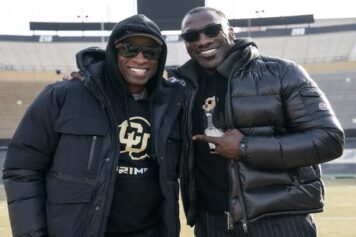Alonzo Adams’ artistic prowess has taken him on a global journey.
He’s impacted the world through his masterful gift of creativity, which has also elevated him to the stature of one of this generation’s most-collected African American Artists.
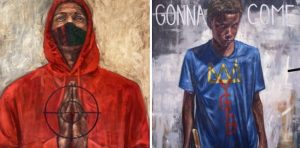
Every amazing piece you see in this celebration of a Black American Original was crafted by the keen eye and flawless hand of Adams.
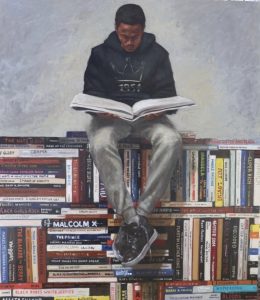
Via the collectionshop.com said this about Adams:
“His pallette is dominated by the earth tones favored by Rembrandt and the American artists he admires, giving his work a poetic, pensive quality.
His professional goal is to keep integrity in art, and his personal ambition is to hang in the world’s great art museums alongside the masters he reveres.
For today, he remains engaged in portraying contemporary black lifestyles, inspired by everyday sights and sounds that deserve immortality in a constantly changing world.”
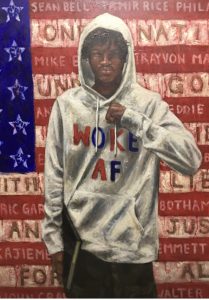
According to his website, https://www.alonzoadams.com/, which features a collection of his coveted works:
“Alonzo Adams work has been featured in solo exhibitions at major public and private venues in the East, including Howard University and the Russell Senate Building in Washington, D.C., Rutgers University, Dow Jones and Uptown Records in New York.”
Forbes Gallery, Art in the Atrium and Swain’s Art Gallery are also among the select exhibitions that have housed Adams’ art.
“He has received commissions from Merrill Lynch, Delta Sigma Theta Sorority, Motown, Ortho Pharmaceutical, Absolut Vodka and Black Enterprise, among others.”
When it comes to moving his art, Adams has a giraffe’s reach and an elite customer base.
His works hang in the collections of Bill Cosby, Earl Graves, Maya Angelou, Patti Labelle, Jasmine Guy, Eddie Murphy, Novartis, Janseen Pharmaceuticals, Nubian Heritage, Richelieu Dennis, Rod Adkins, Nyema Tubman, Emmet Dennis Jr., NBA players Bam Adebayo and Patrick Ewing.
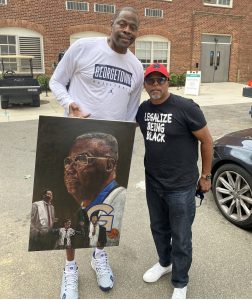
If you want more names dropped, NBA legends Dwyane Wade, Dikembe Mutombo, Alonzo Mourning and Ray Allen, comedian Tracy Morgan and Wesley Snipes are also some of the collectors who undoubtedly paid top dollar to commission an oil painting from Adams.
“With over 25 years as a professional artist, Alonzo has garnered numerous awards in art exhibitions. Many publications have featured articles on Alonzo, including Art Business News, Black Enterprise, Images Magazine, Upscale Magazine and ESPN Magazine to name a few.
He was one of the first African-American artists to become an Absolut Artist. His work was featured in the “Black Romance” exhibit at the Studio Museum of Harlem.
In 2003, three of his original oils were auctioned at Sotheby’s, with a phenomenal response. In 2004, Alonzo was one of the first inductees into the newly created Rutgers African American Alumnae Association Hall of Fame.”
His personal canvas is a mixture of the busy Brown city streets of Harlem USA, the less encumbered suburbs of Plainfield, some southern comfort and overseas exploration.
He expresses this through oils and paintings that speak to the Black human experience.
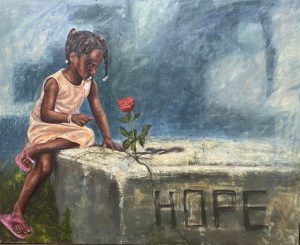
As his life evolved, so did his art and it became a weapon against racism and systemic oppression.
“Born in 1961 in Harlem, NY and raised in Plainfield, New Jersey by my loving Mother. My passion for art was nurtured from the streets of Plainfield to the country roads of North Carolina and enriched by trips to France and Spain,” Adams says on his website.
His inspiration lies in respect for the master craftsmen who preceded him and paved a path for uninhibited creative success.
“I was inspired by such greats as Charles White, Henry O. Tanner, L’Hermitte, John Singer Sargent and Rembrandt,” Adams said.
Adams was also the beneficiary of valuable tutelege and personal support bestowed upon him by some game-changing, culturally impactful Black men.
“I credit David Driskell with mentorship early in my career which helped define my ultimate direction and goals as an artist,” Adams says.
Professor Driskell was a pivotal champion of African-American Art, who died of the coronavirus in April of 2020 at the age of 88. An artist himself, “Driskell recognized the role of Black artists in the broader story of American art.”
I credit Bill Cosby with changing my life by sending me to UPenn for grad school to study art.”
Adams has taken those assists and has not only created a powerful, socially responsible artistic space for himself, but for an entire race of people.
He’s a walking history exhibit covering everything from sports to social issues to contemporary culture and politics.
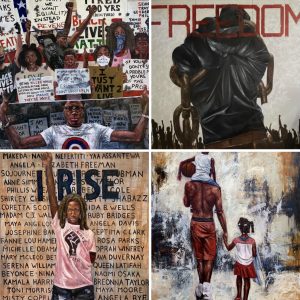
Each piece equally exquisite, temperature-ready and connected in spirit.
Adams stays in high demand because his art portfolio is unapologetic, relevant, powerful, beautiful and rich with tasteful expressions of Black culture — and that never goes out of style.



